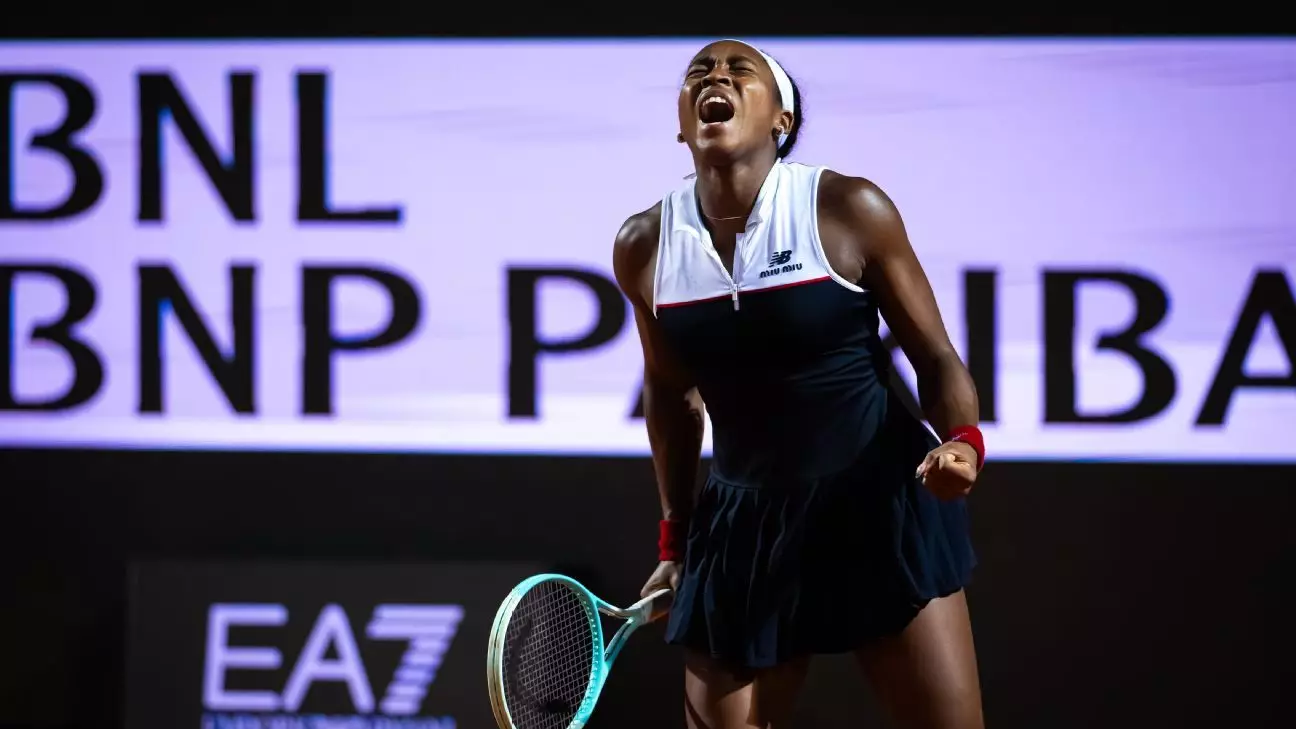Coco Gauff’s journey through the Italian Open has been nothing short of exhilarating, culminating in a hard-fought victory against Zheng Qinwen that showcased her mental toughness and athletic prowess. In a match that extended over three and a half hours, Gauff demonstrated her ability to weather fluctuating moments throughout the game. Each point was laden with tension as she secured a narrow win of 7-6 (3), 4-6, 7-6 (4). What resonates most from this encounter is not merely the final score but how Gauff managed to recover from setbacks, particularly significant in the rollercoaster dynamics of the match. Leading 5-3 in the first set, she briefly faltered, a testament to the psychological intensity that tennis demands. Yet, it was her ability to capitalize on Zheng’s errors, notably a series of double faults that marked the turning point, which underscored her growing maturity in high-pressure situations.
While Gauff accounts for a rising star in women’s tennis, her presence in the final juxtaposes sharply with the emerging force of Italian talent represented by her next opponent, Jasmine Paolini. This matchup marks a pivotal moment as Gauff seeks to add another title to her collection following a strong showing in Madrid. The grit that Gauff exhibited serves as inspiration for budding athletes seeking to carve out their own legacies on the grand stage of tennis.
Jasmine Paolini: A Dream For Italian Tennis
In a parallel narrative, Jasmine Paolini’s ascent to the final of the Italian Open mirrors that of Gauff’s, further electrifying the atmosphere of the tournament. The first Italian woman to reach the final in over a decade, Paolini defeated Peyton Stearns with a compelling display of resolve, rounding out the match at 7-5, 6-1. Here, we witness not just a battle of scores but rather a clash of spirits, as Paolini rallied from the depths of adversity—a set and four games down against Diana Shnaider in the quarterfinals. Reflecting on her accomplishment in reaching the final, she expressed gratitude not only for her own performance but for the rousing support of the home crowd.
Paolini’s story is particularly poignant, as she personifies the revival of Italian women’s tennis. The echoes of bygone eras, when players like Sara Errani captivated audiences in Rome, can now find hope in Paolini’s poise and determination. It resonates with a longing within Italian sports to find success, particularly in the realm of tennis—a sport that has historically eluded sustained dominance from the country’s female athletes.
A Clash of Generational Talents
As Gauff prepares to face Paolini, the narrative sets the stage for a riveting clash between the old guard and the new. Both players, albeit at different stages in their careers, embody a journey filled with trials and breakthroughs. While Gauff at 19 is already basking in the glow of success, Paolini’s triumph at 27 signifies a different kind of perseverance, a determination that resonates through beautifully etched experiences on and off the court.
This match isn’t just about trophies; it’s about identity, legacy, and the heartfelt connection players develop with fans. Tennis often becomes a canvas where emotions paint intricate stories, and the audience becomes part of that narrative. The grounding sentiment of Paolini expressing, “We won this match together,” speaks volumes about the camaraderie shared by athletes and their supporters amid competitive rivalries.
The Men’s Side Brims with Potential
On the men’s side, Jannik Sinner’s explosive performance against Casper Ruud, where he swept the match decisively at 6-0, 6-1, reflects the rising tide of talent in Italian tennis. Sinner’s victory journey is equally inspiring as he cruises into his first semifinal in Rome, showcasing not just dominance but an all-encompassing mastery over the court. His reflections on feeling great on court emphasize how mental recovery and confidence are crucial facets of top-tier sports.
Sinner’s swift control over the match reveals a growing sophistication in his game, all while embodying the hopes of a nation that feels the weight of expectation mingled with pride. Facing Tommy Paul next, Sinner illustrates a broader narrative in both men’s and women’s tennis—an intertwining path where both mental and physical agility dictate performances.
Thus, the Italian Open reflects more than mere athleticism; it encapsulates human emotion, struggles, and victories. The tournament breathes life into stories of resilience, making it a stage that demands recognition for the remarkable talents emerging from its courts. This is sports at its enlightening best, where the true essence lies in the indomitable spirit of athletes striving to become champions, against both external challenges and their introspective battles.

